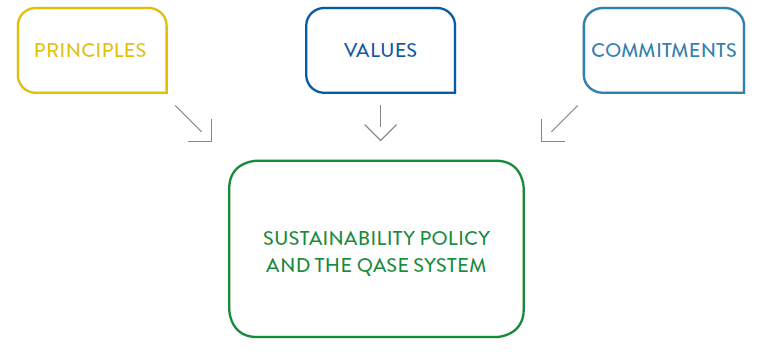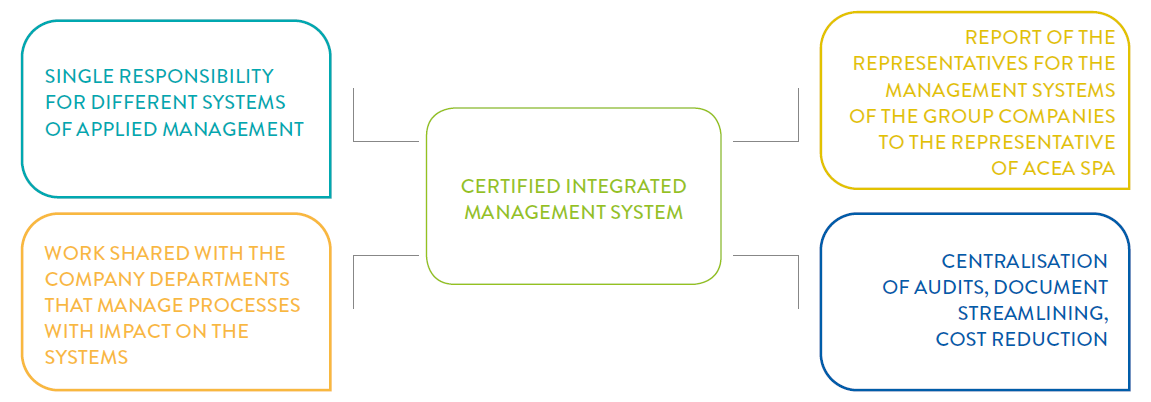Management systems
A complex internal rule system supervises the organisational system of corporate governance for the proper running of the Group’s activities, from the definition of the general guideline directives to the formal statement of the particular business aspects, according to the following criteria:
- the Group guidelines are the Principles, Policies and Management Regulations through which Acea SpA acts and exercises its role of direction, guidance, coordination and control with respect to the Companies of the Group and define the general guidelines to be followed;
- procedures govern the way in which the operational phases of a process are implemented, identifying the roles and responsibilities in detail. The procedures also define the forms to be used and the records to be archived.
Each corporate structure responsible for the individual issues subject to internal standardisation (Process Owner) processes the documents – involving the structures concerned – in compliance with the defined organisational responsibilities.
In order to ensure general consistency of the documents and verification of regulatory compliance each document is subject to verification by:
- Company Planning and Organisation Unit, with regard to the consistency of the document with the organisational structure and with internal regulations;
- Integrated Certification Systems Unit for document compliance with management systems;
- Compliance Unit with regard to compliance with regulations of reference (Legislative Decree no. 231, antitrust regulations, etc.);
- DPO Office Unit regarding compliance with privacy regulations;
- Internal Control Systems of Financial Information Unit with regard to the consistency of the document with the management system of the Internal Control System of Financial Information.
Acea recognises the following values as a fundamental element for the sustainability of the managed activities: promoting the culture of quality, respect of the environment and protecting ecosystems, the valorisation of persons and safety at the workplace, efficient management of resources, risk assessments and the responsible management of impacts, economic, social and environmental, dialogue with the stakeholders and promoting sustainability in the value chain, involving the supply chain.
Consistently with such guideline, in Acea there is a Policy for sustainability and the quality, environment, safety and energy system 21, which breaks down the principles, values and commitments undertaken by the company, placing them in the framework of the pursuit of sustainable development and it is an integral part of the Management Systems conform to standards ISO 9001, ISO 14001, OHSAS18001 e ISO 50001.
21 - The Policy is available from the institutional website, www.gruppo.acea.it.
CHART NO. 12 - SUSTAINABILITY POLICY AND THE QASE SYSTEM

The Integrated Certification Systems Unit within the Risk & Compliance Function defines the methods and standards of reference for the implementation of QASE certified management systems as well as for further certifications, accreditations and certifications that the Acea Group intends to acquire, and operates in synergy with the QASE Units present in the individual operating companies.
These Units collaborate with the Energy Manager for the development and management of the Energy Management System and with the Head of the Prevention and Protection Service (RSPP) and the emergency coordinator for the Safety Management System. The management of health, safety and environmental emergencies in Acea is handled by means of a specific procedure (see the chapter on Institutions and the company, in particular the sub-section on Operational risk management for the protection of the common assets).
Acea also relies on professional profiles such as the Energy Manager and Mobility Manager, whose duty is to respond to the demands for optimum management of internal energy consumption and staff mobility. The duties of the Energy Manager and Mobility Manager are aimed at seeking systemic efficiencies and savings in important aspects related to the running of an organisation, such as use of energy and employees’ transfers, which also create positive external effects in terms of lower use of resources and reduction in greenhouse gas emissions and optimisation of travelling times and routes for employees, respectively, while increasing road safety and reducing urban traffic. The Energy manager, in particular, has the duty of implementing actions regarding energy efficiency, reduction of consumption and cost control, in order to ensure the progressive optimisation of the Group’s energy costs, activating coordination with all the Energy managers in Acea companies.
CHART NO. 13 - THE CERTIFIED INTEGRATED MANAGEMENT SYSTEM

The management of quality, the environment, safety and energy are central aspects in corporate operations, as confirmed by the number of Group companies which have implemented certified integrated management systems over time.
As of 31.12.2018 11 of the Group companies are equipped with certified management Systems (see Table no. 8) and they have all initiated the process for transition to the new standards ISO 9001:2015 and ISO 14001:2015.
The Acea Ambiente plants located in Terni, San Vittore del Lazio and Orvieto are EMAS registered.
New developments in 2018 include: the transition from OHSAS18001 to the new ISO 45001 health and safety certification for Acea Ato 5; the acquisition of ISO 45001 certification for Ecogena; the acquisition of ISO 9001 certification for Acea Ambiente, in addition to the extension of ISO14001 and OHSAS 18001 certifications to the Sabaudia composting plant and ISO 50001 certification at the Terni waste-to-energy plant; ISO 39001 certification “Road traffic safety management system” for Aquaser. Moreover, during the year the process for renewing SOA certification was completed for Acea SpA.
Considering the companies as a whole, about 75% hold a quality certification, 75% an environmental certification (100% in the Water and Environment business areas) more than 90% have safety certification (100% in the Water, Environment and Infrastructure industrial segments) and more than 40% an energy certificate management system.
TABLE NO. 8 - CERTIFIED MANAGEMENT SYSTEMS IN THE ACEA GROUP (AS AT 31.12.2018)
| QUALITY (ISO9001) | ENVIRONMENT (ISO14001) | SAFETY (OHSAS18001) | ENERGY (ISO50001) | OTHER | |
| Acea SpA | X | X | X | X | |
| WATER AND ENGINEERING SEGMENT | |||||
| Acea Ato 2 SpA | X | X | X | X | |
| Acea Ato 5 SpA | X | X | X (ISO 45001) | X | |
| Gesesa SpA | X | X | X | ||
| Acea Elabori SpA | X | X | X | UNI CEI EN ISO/IEC 17025:2005 Accreditation of lab analyses UNI CEI EN ISO/IEC 17020:2012 Accreditation of inspection bodies | |
| ENERGY INFRASTRUCTURE SEGMENT | |||||
| Areti SpA | X | X | X | X | |
| Acea Produzione SpA | X | X | |||
| Ecogena SpA | X | X (ISO 45001) | UNI CEI 11352 | ||
| COMMERCIAL AND TRADING SEGMENT | |||||
| Acea Energia SpA | X | ||||
| Acea8cento Srl | |||||
| ENVIRONMENT SEGMENT | |||||
| Acea Ambiente Srl | X | X | X | X | EMAS |
| Aquaser Srl | X | X | X | ISO 39001:2012 | |
Each company that implements certified management systems carries out an annual review by its management with the aim of assessing the effectiveness of quality, environment, safety and energy management systems, proposing possible improvements and verifying the progress of activities. On these occasions, which are always attended by the Top Management and the first line of managers of the Companies in question, numerous elements are analysed, like: policy; context analysis and materiality analysis at a Group level; risk assessment; process performance; significant environmental and energy aspects; changes in legal requirements and those relating to health and safety, environment and energy; supplier performance; customer satisfaction levels; analysis of complaints; accidents and injuries; objectives.
The results of the review 2018, finding no criticalities, confirmed the adequacy and efficiency of the management Systems.
Finally, it should be noted that during the year, Acea – continuing the process of integration initialised and formalised with the adoption last year of the Sustainability Policy and the environmental, safety and energy quality system – decided to consider that the objectives required by the management system should coincide with the objectives of the 2018-2022 Sustainability Plan approved by the Board of Directors.